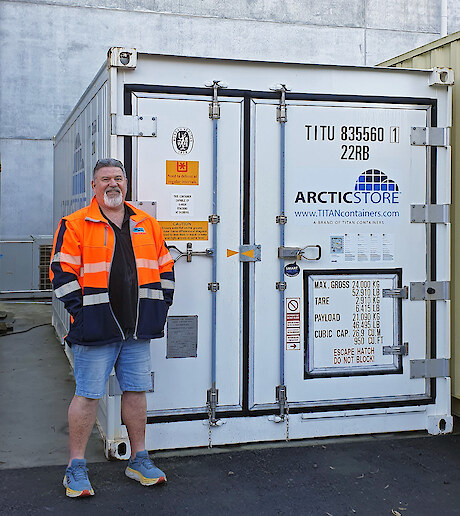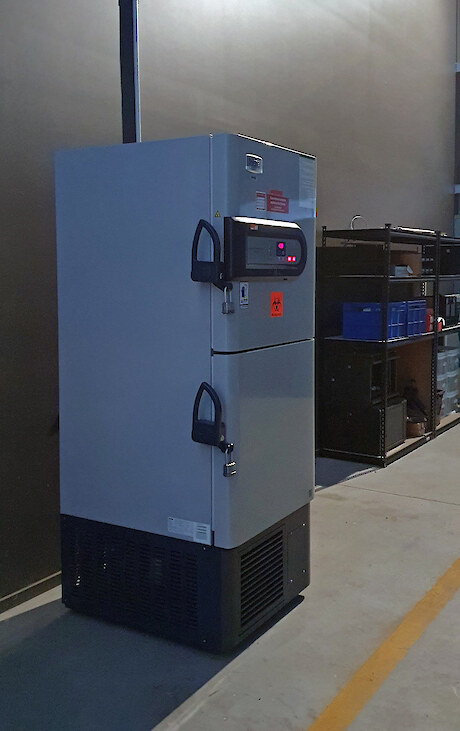Murihiku ki Te Tonga Acquires Globally Significant Antarctic Sample Collection
On July 19, 2023, the Murihiku ki Te Tonga – Ross Sea Sector Research & Monitoring Programme took possession of a globally significant collection of scientific samples from Antarctica. The samples include a wide range of top predator species – Antarctic toothfish, Adélie penguins, South Polar skuas, Weddell seals, minke whales, and killer whales – and took six expeditions to Antarctica to collect.
 Key top predators in the Ross Sea. Clockise from Top left: South polar skua, Type-C killer whale and Antarctic toothfish, Weddell seal and Pagothenia borchgrevinki, crabeater seal, Adélie penguin, and minke whale. Photos: P.H. Ensor (killer whale), R. Currey (minke whale), R. Eisert
Key top predators in the Ross Sea. Clockise from Top left: South polar skua, Type-C killer whale and Antarctic toothfish, Weddell seal and Pagothenia borchgrevinki, crabeater seal, Adélie penguin, and minke whale. Photos: P.H. Ensor (killer whale), R. Currey (minke whale), R. Eisert
The primary objective of this research, led by Dr Regina Eisert, is to support the Ross Sea region Marine Protected Area (MPA). The Ross Sea region MPA due south of Murihiku is the world’s largest MPA and administered by CCAMLR, an international association that regulates Southern Ocean fisheries using ecosystem-based management. In 1997, New Zealand started a fishery for toothfish in the Ross Sea region that expanded to include vessels from other CCAMLR nations. Antarctic toothfish is a valuable, large and high-fat fish exported primarily to Asia and the USA. In 2017, CCAMLR established the MPA following an extended campaign driven by New Zealand and the USA.
 Steve Bamford of Boxman Christchurch in front of the TITAN refrigerated container, or ‘reefer’, that contains the bulk of the sample material. This reefer is capable of keeping contents at -40°C. This is very important for ensuring the integrity of scientific specimens long-term, as animal tissues are not fully frozen at normal freezer temperatures. Photo: R. EisertWhile the MPA was a major achievement, ongoing research & monitoring are mandatory to maintain the region’s protected status and demonstrate that existing restrictions on fishing are effective. Major gaps remain in our understanding of how the Ross Sea food web works and how removal of toothfish affects other species, for example Weddell seals and killer whales that also like to eat toothfish and may depend on it.
Steve Bamford of Boxman Christchurch in front of the TITAN refrigerated container, or ‘reefer’, that contains the bulk of the sample material. This reefer is capable of keeping contents at -40°C. This is very important for ensuring the integrity of scientific specimens long-term, as animal tissues are not fully frozen at normal freezer temperatures. Photo: R. EisertWhile the MPA was a major achievement, ongoing research & monitoring are mandatory to maintain the region’s protected status and demonstrate that existing restrictions on fishing are effective. Major gaps remain in our understanding of how the Ross Sea food web works and how removal of toothfish affects other species, for example Weddell seals and killer whales that also like to eat toothfish and may depend on it.
The Murihiku Antarctic sample collection is unique worldwide in containing sequential samples from key top predators spanning the entire period from the pre-MPA baseline until after the establishment of the MPA (2013-2020). Murihiku ki Te Tonga is continuing this critical scientific research.
 Part of the collection is stored in extreme cold temperature freezers (-80°C). Photo: R. EisertMurihiku Regeneration is working with TITAN Containers NZ, supplier of state-of-the-art refrigerated containers, and Boxman Christchurch. Through the Ministry of Primary Industries, Boxman Christchurch recently acquired the certification needed to receive and store biological specimens from Antarctica. Secure and reliable sample storage is key to building capability for research, science and innovation and signals another milestone achievement for Murihiku Regeneration.
Part of the collection is stored in extreme cold temperature freezers (-80°C). Photo: R. EisertMurihiku Regeneration is working with TITAN Containers NZ, supplier of state-of-the-art refrigerated containers, and Boxman Christchurch. Through the Ministry of Primary Industries, Boxman Christchurch recently acquired the certification needed to receive and store biological specimens from Antarctica. Secure and reliable sample storage is key to building capability for research, science and innovation and signals another milestone achievement for Murihiku Regeneration.
Posted: 24 July 2023
